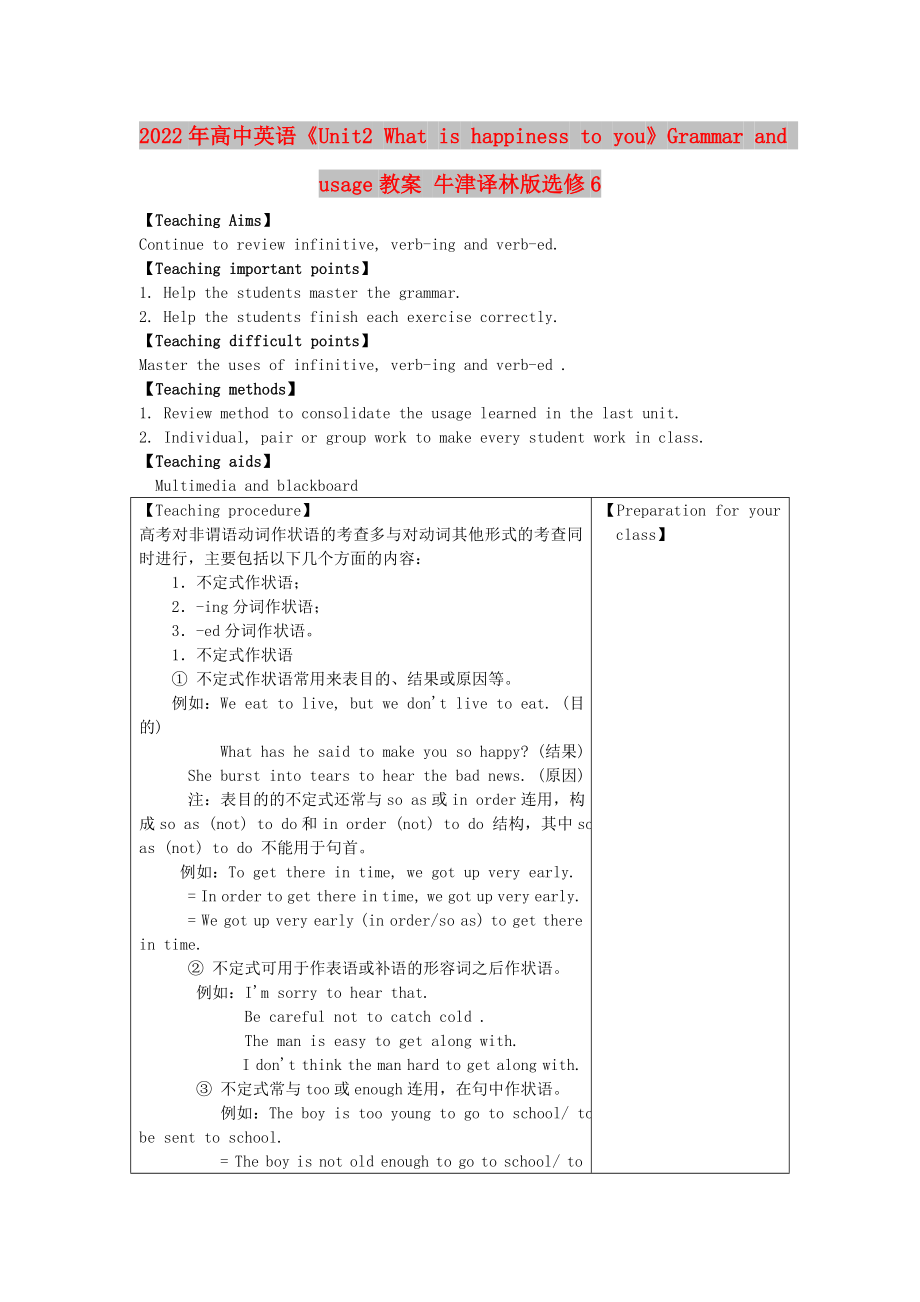《2022年高中英語(yǔ)《Unit2 What is happiness to you》Grammar and usage教案 牛津譯林版選修6》由會(huì)員分享��,可在線閱讀�,更多相關(guān)《2022年高中英語(yǔ)《Unit2 What is happiness to you》Grammar and usage教案 牛津譯林版選修6(3頁(yè)珍藏版)》請(qǐng)?jiān)谘b配圖網(wǎng)上搜索。
1�����、2022年高中英語(yǔ)《Unit2 What is happiness to you》Grammar and usage教案 牛津譯林版選修6
【Teaching Aims】
Continue to review infinitive, verb-ing and verb-ed.
【Teaching important points】
1. Help the students master the grammar.
2. Help the students finish each exercise correctly.
【Teaching difficult points】
Ma
2�、ster the uses of infinitive, verb-ing and verb-ed .
【Teaching methods】
1. Review method to consolidate the usage learned in the last unit.
2. Individual, pair or group work to make every student work in class.
【Teaching aids】
Multimedia and blackboard
【Teaching procedure】
高考對(duì)非謂語(yǔ)動(dòng)詞作狀語(yǔ)的考查多與對(duì)動(dòng)詞
3、其他形式的考查同時(shí)進(jìn)行�,主要包括以下幾個(gè)方面的內(nèi)容:
1.不定式作狀語(yǔ);
2.-ing分詞作狀語(yǔ)���;
3.-ed分詞作狀語(yǔ)�。
1.不定式作狀語(yǔ)
?、?不定式作狀語(yǔ)常用來(lái)表目的、結(jié)果或原因等�����。
例如:We eat to live, but we don't live to eat. (目的)
What has he said to make you so happy? (結(jié)果)
She burst into tears to hear the bad news. (原因)
注:表目的的不定式還常與so as或in
4、order連用�,構(gòu)成so as (not) to do和in order (not) to do 結(jié)構(gòu),其中so as (not) to do 不能用于句首�����。
例如:To get there in time, we got up very early.
= In order to get there in time, we got up very early.
= We got up very early (in order/so as) to get there in time.
?�、?不定式可用于作表語(yǔ)或補(bǔ)語(yǔ)的形容詞之后作狀語(yǔ)����。
例如:I'
5���、m sorry to hear that.
Be careful not to catch cold .
The man is easy to get along with.
I don't think the man hard to get along with.
③ 不定式常與too或enough連用�����,在句中作狀語(yǔ)�。
例如:The boy is too young to go to school/ to be sent to school.
= The boy is not old enough
6�、to go to school/ to be sent to school.
④ 不定式有時(shí)用于so...as to do sth.結(jié)構(gòu)中作狀語(yǔ)。
例如:Will you be so kind as to help me with the work?
⑤ 有時(shí)��,不定式還可修飾一個(gè)句子,表明說(shuō)話人的態(tài)度��。常見(jiàn)的這類(lèi)不定式有to tell you the
truth, to be honest, to be franc, to be fair, 等����。
例如:To tell you the truth, I don't like th
7、e film.
2.-ing分詞和-ed分詞作狀語(yǔ)
① -ing分詞和-ed分詞作狀語(yǔ)修飾謂語(yǔ)��,多說(shuō)明動(dòng)作發(fā)生的背景��、方式或伴隨情況�����。如果在邏輯
上句中的主語(yǔ)與分詞有主謂關(guān)系��,用-ing分詞��,有動(dòng)賓關(guān)系則用-ed分詞�。
例如:We enjoyed ourselves in the park, singing and dancing.
Built in 1900, the house is now 100 years old.
② -ing分詞和-ed分詞都可作原因或時(shí)間狀語(yǔ), 其作用相當(dāng)于一個(gè)相應(yīng)的狀語(yǔ)從句。如果在邏輯
上句中的
8�、主語(yǔ)與分詞有主謂關(guān)系,用-ing分詞�����,有動(dòng)賓關(guān)系則用-ed分詞。
例如:Being so poor in those days, they couldn't send the boy to school.(原因)
Born in a poor family, the boy could not go to school. (原因)
Hearing the bad news, she burst into tears. (時(shí)間)
Seen from the hill, the park looks more beautiful. (時(shí)間)
3.-ing
9�����、分詞有時(shí)可作結(jié)果狀語(yǔ)��。
例如:Her husband died in the war, leaving her a widow with three children.
We got up very early, arriving at the hospital ahead of time.
4.-ed分詞有時(shí)用作條件狀語(yǔ)�,其作用相當(dāng)于一個(gè)條件狀語(yǔ)從句。
例如:Given more time, we could have done it much better.
5.如果不定式或分詞表示的動(dòng)作在謂語(yǔ)動(dòng)詞表示的動(dòng)作之前發(fā)生�����,該不定式或分詞用完成式�����。
10����、 例如:I'm sorry to have given you so much trouble.
Having never/Not having met the man before, I couldn't recognize him at first.
Having finished my homework, I went to play football.
【典型例題】
1.(NMET98, 單項(xiàng)填空)European football is played in 80 countries, _______ it the most
popular sport i
11�����、n the world.
A. making B. makes C. made D. to make
正確答案:A 此題考查-ing分詞作結(jié)果狀語(yǔ)的用法���,所以選A�。
2.(NMET96,單項(xiàng)填空)_______ in thought, he almost ran into the car in front of him.
A. Losing B. Having lost C. Lost D. To lose
正確答案:C 此題考查-ed分詞短語(yǔ)作原因狀語(yǔ)的用法 be lost in thought是一個(gè)短語(yǔ)���,意為"陷入沉思"����,所以選C�。
3.(MET90,單項(xiàng)填空)T
12�����、om kept quiet about the accident _______ lose his job.
A. so not as to B. so as not to C. so as to not D. not so as to
正確答案:B 此題考查不定式作目的狀語(yǔ)及其結(jié)構(gòu)�,所以選B。
【知識(shí)過(guò)關(guān)】
1. She set out soon after dark _______ home an hour later.
A. arriving B. to arrive C. having arrived D. and arrived
2. "Can'
13�����、t you read?" Mary said _______ to the notice.
A. angrily pointing B. and point angrily
C. angrily pointed D. and angrily pointing
3. _______ a reply, he decided to write again.
A. Not receiving B. Receiving not
C. Not having received D. Having not received
4. She
14�����、is upstairs _______ letters.
A. writes B. is writing C. write D. writing
5. The secretary worked late into the night, _______ a long speech for the president.
A. to prepare B. preparing C. prepared D. was preparing
正確答案:1. D 2. A 3. C 4. D 5. B
【作業(yè)布置】
【教學(xué)后記】
【Preparation for your class】
 2022年高中英語(yǔ)《Unit2 What is happiness to you》Grammar and usage教案 牛津譯林版選修6
2022年高中英語(yǔ)《Unit2 What is happiness to you》Grammar and usage教案 牛津譯林版選修6

